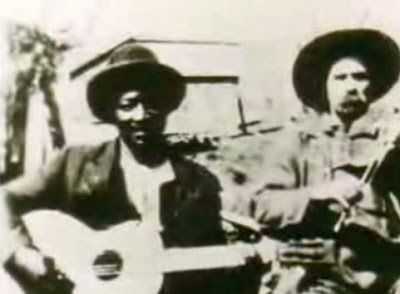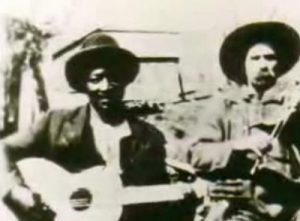
Arnold Shultz (1886–1931) was an African-American fiddler and guitarist who is noted as a major influence in the development of the “thumb-style,” or “Travis picking” method of playing guitar.
Shultz, the son of a former slave, was born into a family of touring musicians in Ohio County, Kentucky, in 1886. In 1900, Shultz began studying guitar under his uncle, developing a jazzy “thumb-style” method of playing guitar that eventually evolved into the Kentucky style for which such musicians as Chet Atkins and Merle Travis would be known. Professionally, Shultz was a laborer, traveling from Kentucky through Mississippi and New Orleans, working with coal or as a deck hand.
In the early 1920’s, he played fiddle in the otherwise white hillbilly and Dixieland band of Forest “Boots” Faught. To the occasional complaints this brought (objections like “You’ve got a colored fiddle. We don’t want that!”), Faught would simply reply, “I’ve got the man because he’s a good musician.” Shultz also played with Charlie Monroe and gave Bill Monroe the opportunity to play his first paid musical gig, joining together at a square dances with Shultz playing fiddle and Monroe on guitar.
Though he was not recorded, his blues playing made a powerful influence. Bill Monroe, who was formative in the development of bluegrass music, has openly cited Shultz as an influence on his playing, and Shultz taught his guitar methods to Kennedy Jones, who disseminated the “thumb-style” methods further. His methods were passed down further to Merle Travis and Ike Everly.
Schultz died in 1931 of a heart problem, a mitral buy viagra overnight lesion, though legends have
persisted that he died as a result of poisoning by a white musician who was jealous of him. Less colorful reports indicate that he suffered a stroke while boarding a bus. Arnold Schultz died in Butler County, Kentucky, near the small city of Morgantown. He is buried in the town’s only African American cemetery at the end of Bell Street.
Schultz was also a big influence on the father of bluegrass Bill Monroe. Bill Monroe is usually considered as the father of bluegrass. He basically invented this genre, drawing from the early mountain music he grew up with, building a new image, cunningly bringing together like-minded visionaries, and never forgetting his roots in the old square dance tunes he grew up playing. Bluegrass has since become one of the most conservative branches of country music and finding black professional bluegrass artists is almost as challenging now as it has been historically. It may be the last bastion of white supremacy in American roots music today and more’s the pity since Monroe himself credited black roots music for his inspiration. In particular, he lauded Arnold Schultz, a black guitarist of some renown in his home state of Kentucky. Monroe studied and hung out with Schultz as a young man, soaking up his stories, fascinated by Schultz’s picking patterns on the guitar.

